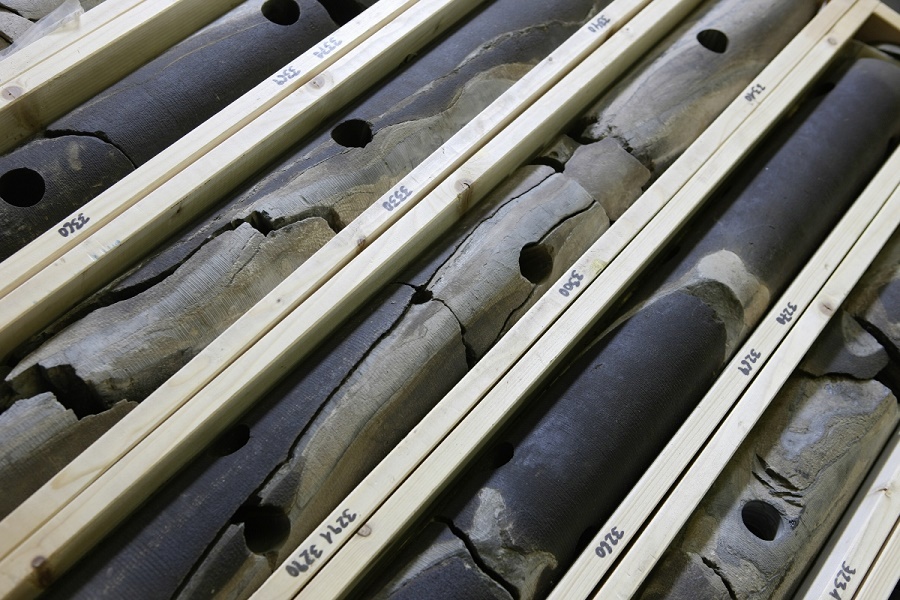Saudi startup's device to aid search for oil

In an oil-based economy like Saudi Arabia, finding oil and gas is almost as important as finding water.
The country’s efforts to become a more diversified economy are still in the very early days, with the oil and gas sector accounting for about 50 percent of gross domestic product and about 85 percent of export earnings, according to OPEC.
In light of this reality, three Saudi entrepreneurs are trying to make it easier for companies to locate oil and gas reservoirs.
Abdullah AlBattal, Arbab Latif and Hamad Al-Muqbel are working on a device that scans rock samples in order to identify properties such as porosity and permeability - basically the spaces inside rocks where oil can be found and how these spaces are connected.
Breaking through
They set up Core Echo in March 2014, were incubated at King Fahd University of Petroleum and Minerals (KFUPM) in 2015, and have participated in several startup competitions since then, winning first place in the university’s business plan competition.
The team raised approximately $20,000 in seed funding, which they allocated to the development of an initial prototype.
This prototype is being used to test the final product, which will be cubic in shape and small enough to fit in a carry-on bag on an airplane.

A patent was filed early on and they are in the process of filing a second one with KFUPM’s IP office.
The device uses ultrasonic waves to identify differences in core rock samples. The data collected is then entered into a set of algorithms designed by AlBattal and Latif, and analyzed by a software designed by Al-Muqbel.
According to the team, the methods used to analyze rock samples have not seen any major developments over the past two decades.
“Core Echo has, however, found a solution to this challenge by reducing the time it takes to analyze one rock sample, and extract all the necessary properties, from weeks to just an hour,” the company website said.
Getting an edge on rivals
There are existing companies that are offering similar solutions, like Core Lab and Vindum Engineering Inc, both based in the US.
But according to Core Echo’s CEO AlBattal, their competitions’ technology doesn’t provide as full a picture of rock samples as that being developed by his startup.
“The scans used in the industry are only used for viewing the structure of the core samples. Most of the attempts to extract porosity and permeability from them are not accurate and tend to give qualitative representations rather than actual measurements,” he told Wamda.

High tech, high interest?
Their investors back this claim. The team just closed its first fundraising round, raising 600,000 Saudi riyals (US$160,000) from the Dhahran Techno Valley Company (DTVC).
“DTVC is mandated to support early stage technologies in the commercialization process,” said Ameen Bin Obadi, technology commercialization executive at DTVC.
“Core Echo is one of the high tech ideas that demonstrates high potential in the core analysis industry, as the technology is unique in its approach to analyzing core [samples], cutting high operational costs and reducing the required time dramatically.”
The team is targeting both oil and gas service companies and oil and gas producers, and is in talks with Halliburton and Saudi Aramco, among others. They hope to put the device on the market in the next year.
Not Silicon Valley, nor Houston
The US would likely have been a more supportive place for an oil startup to launch. The US shale oil and gas sector has spurred a resurgence in startups working in the field as well as corporate and VC interest in them.
Yet Saudi Arabia is becoming an increasingly attractive option for small businesses in the Gulf region as top academic institutions such as King Abdullah University of Science and Technology and DTVC offer capital, natural resources and incubation programs.
AlBattal is a sign of this gradual shift. Although he studied at the University of Southern California (USC), where he earned a master’s degree in electrical engineering, he deliberately chose Saudi Arabia as the birthplace of his startup.
“It’s a dream of mine to make a technology-based startup a reality here in the kingdom. I’d like to set an example in Saudi Arabia,” he said. “More and more people are trying to adopt the Silicon Valley entrepreneurship spirit here.”
Although many Saudis study abroad in the UK and the US, many return to their home country to launch entrepreneurial projects.
Networking on campus
The decision to launch the startup in the Dhahran Techno Valley campus is also a decision based on pragmatic realities, as DTVC aims to attract global oil companies to the campus.
“We want to make Dhahran the hub for startups in energy, oil and gas,” AlBattal said.
This is clearly reflected in the implementation of R&D hubs like DTVC, which was launched at KFUPM to focus on the technological aspects of petroleum processes and is a melting pot of well-established companies and young startups that are developing breakthrough technologies. Oil producers such as Saudi Aramco, and oil services companies such as Schlumberger, Baker Hughes, Honeywell and Weatherford all have offices on campus.
As oil reservoirs in Saudi Arabia naturally decline and as more difficult-to-extract fields are discovered, technologies that ease the processes of finding and extracting oil will become more useful and hence, more profitable for their creators.


